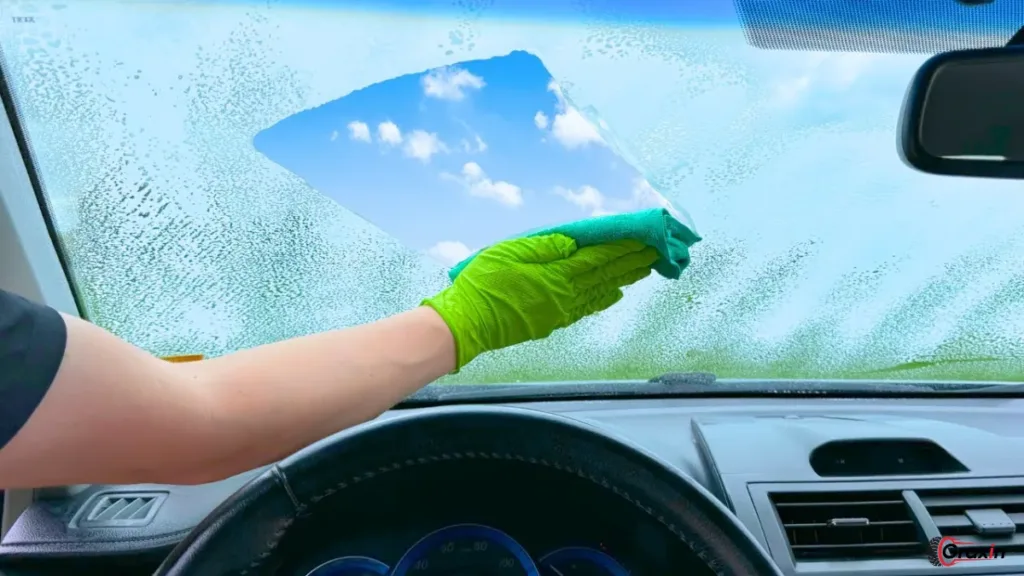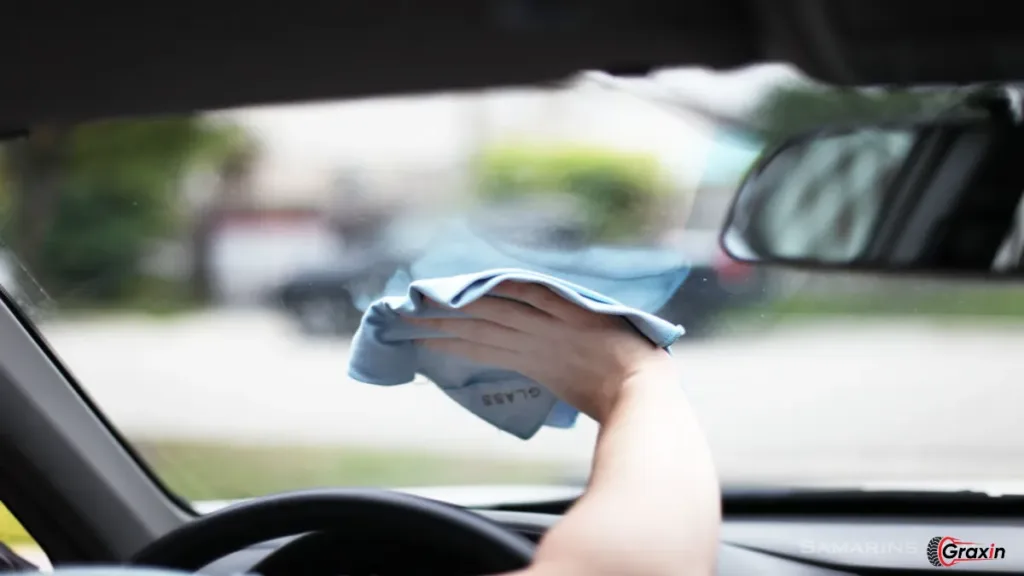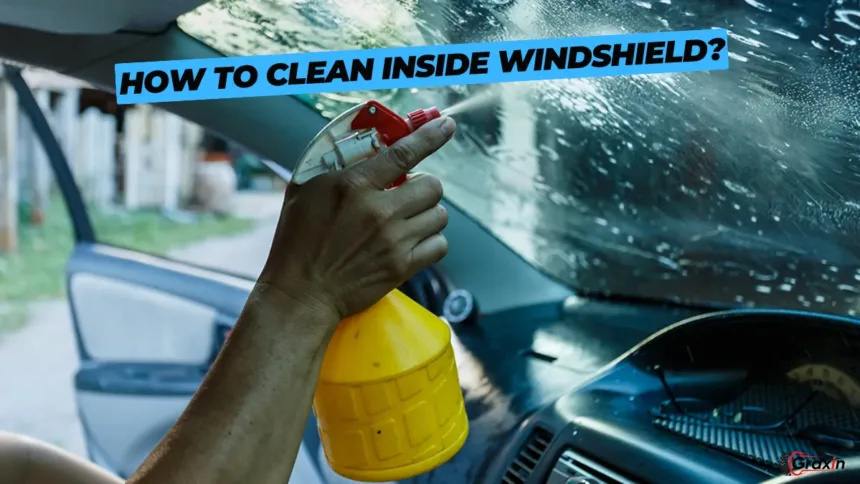For safe driving, the inside of your windshield must be kept spotless. A dirty or streaky windshield can create dangerous glare by allowing parts of that glare into a driver’s eyes: even this is preventable when the sun hits your windshield at certain angles. It might be dust, fingerprints, or that mysterious film which builds up over time in your windshield’s interior-but it doesn’t have to be a chore to clean. With the right steps, it will be looking crystal clear and streak-free in no time.
It’s a complete manual on how to clean the inside of a windshield, why it’s so crucial, and some tips to make it easier. Let’s get started!
Why Cleaning the Inside of the Windshield Is Important
Besides being frustrating, dirty windshields are dangerous to drive with; dirty windscreens distort vision to the road and may cause accidents when driving at night, especially when there are streaks or film, which intensifies the glare from oncoming headlights. Here’s why it matters:
- Glare reduction: A clean windshield reduces glare from the sun and headlights, ensuring better visibility.
- Clear vision: Dirt and smudges can obscure your view, leading to slower reaction times in emergencies.
- Longevity of the glass: Regular cleaning prevents abrasive particles from scratching and wearing down the windshield.
- Overall aesthetics: A clean windshield just makes your car look better, inside and out.
Common Causes of Dirty Inside Windshields

Before that, however, knowledge about how to clean it entails knowing what forms the layer of grime inside the windshield of your car. That would definitely give way to a much better plan for the solution.
- Outgassing: Modern car interiors are made with a variety of plastic and vinyl materials. Over time, these materials release chemicals that form a sticky film on the windshield, a process known as outgassing.
- Dust and debris: As you drive, dust particles from the air, shoes, and clothing settle on your dashboard and make their way onto the glass.
- Fingerprints and smudges: Every time you touch the windshield whether it’s to wipe away fog or something else you leave behind oils that create smudges.
- Smoke: Cigarette smoke, or even smoke from a vehicle’s engine, can leave a greasy film on the glass.
- Condensation and humidity: Moisture can cause fogging and leave watermarks when it dries. This is especially common in humid climates.
What You’ll Need to Clean Your Windshield
Before actually cleaning the spot glass, appropriate cleaning tools have to be gathered in order for the cleaning process to go as fluid as possible. Wrong materials would scratch and damage it, thus proper tools should be used.
Materials Required:
- Microfiber cloth: These are great for picking up dirt without leaving streaks or scratches.
- Glass cleaner: Choose an ammonia-free glass cleaner to avoid damaging any window tints.
- Water and white vinegar: A 50/50 mix of water and vinegar can be used as an effective, natural alternative to commercial cleaners.
- Rubbing alcohol: Helps remove grease and oils, ensuring a streak-free finish.
- Sponge or foam pad: For scrubbing stubborn areas.
- Spray bottle: For mixing and applying the cleaning solution.
Step-by-Step Guide to Cleaning the Inside of Your Windshield
1. Prepare the Cleaning Area
It should have a cool surface. It takes the direct sunlight for drying cleaning solutions that cause streaks to appear on windows. This, therefore, should be done in the shade.
2. Dust the Windshield
Using a dry microfiber cloth, wipe down the surface to remove dust, dirt, and debris. This step prevents scratching during the cleaning process.
3. Apply Cleaning Solution
Spray a light mist of glass cleaner or your solution to a clean microfiber cloth. Don’t spray cleaners directly on the glass; drips may land on your dash or seats.
4. Wipe in Circular Motions
Start at the top of the windshield and work your way down, using circular motions to cover the entire surface. This helps ensure even cleaning and prevents streaks.
5. Tackle Stubborn Stains with Rubbing Alcohol
For grease, oil, or smoke film, apply a small amount of rubbing alcohol to a corner of your microfiber cloth and gently rub the affected areas. This breaks down any stubborn residue.
6. Buff with a Dry Cloth
Once the glass is clean, use a dry microfiber cloth to buff the windshield. This step ensures there are no leftover streaks or watermarks.
7. Inspect the Glass
Look at the windshield from different angles, especially in bright light, to ensure all smudges and streaks have been removed. If you see any spots, repeat the cleaning process as necessary.
Pro Tips for Keeping Your Windshield Cleaner for Longer

Cleaning the inside of your windshield is one thing, but how do you keep it cleaner for longer? Here are a few pro tips to extend the time between cleanings:
- Use a dashboard cover: This reduces the outgassing effect from your car’s interior materials.
- Avoid touching the glass: Keep your hands off the windshield to prevent smudges and fingerprints.
- Regularly dust the interior: Dusting your dashboard and car interior will help reduce the amount of debris that ends up on the windshield.
- Keep your car ventilated: Proper ventilation helps reduce condensation and prevents that dreaded film from forming.
FAQs about Cleaning the Inside of a Windshield
Q: What’s the best cleaner for the inside of a windshield?
A: An ammonia-free glass cleaner is ideal, but a mix of vinegar and water works great as a natural alternative. Avoid cleaners with ammonia, especially if you have tinted windows.
Q: How often should I clean the inside of my windshield?
A: You should aim to clean the inside of your windshield every two weeks or at least once a month, depending on how often you drive and the conditions in which you park.
Q: Why does the inside of my windshield keep getting foggy?
A: Fog on the inside of your windshield is usually caused by condensation, which occurs when there’s a difference in temperature between the interior and exterior of the car. Using your defroster and keeping your car well-ventilated can help reduce fogging.
Q: Can I use paper towels to clean my windshield?
A: It’s best to avoid paper towels, as they can leave lint and cause streaks. Instead, use a microfiber cloth for a streak-free shine.Q: Why is there a haze on my windshield after cleaning?
A: If you notice a haze after cleaning, it could be due to outgassing from your dashboard materials. Try using rubbing alcohol or a stronger cleaning solution to break down the haze.
Also Read : Do Hybrid Car Need Smog Check?







